It's not exactly perfect that a Mexican-American actress, Lupe Vélez, is plugged in as a Native-American in the third and final version of this film, but it's better to see her than someone like Myrna Loy (no offense Myrna, you know I adore you). And in addition to seeing a person of color in a dramatic and romantic role, the side benefit is that unlike most of her other films, Vélez's character is not some high-strung Latina who has to have a scene or two of animated screaming. Here her character is quiet, doleful, determined, strong, and caring, giving us another side of her as an actress, and her performance is at least as good as the other films I've seen her in, if not better. After being saved by a transplanted Englishman (Warner Baxter) from being assaulted in a saloon, something that would likely have led to rape, her character returns the favor with steely resolve by saving him not once but twice. Vélez has several fine scenes, one of which is when she's in front of the fireplace on a stormy night, radiating soft sensuality. Later she has a perfect reaction to her young son wanting to play with his new train set more than her traditional, handmade horse. It reflects the timeless clash of cultural assimilation, and immigrant parents with kids more drawn to the newer culture they are surrounded by may identify. In several moments throughout the film, Vélez's emotions are conveyed silently through her eyes, and they're all pretty compelling.
Unfortunately, there are also aspects of the character that are harder to like, starting with the broken English she has to speak. It may have been the reality for such a character, but here it's so slow and awkward, and not accompanied with enough other nuance that might help us see that she's just as intelligent despite not being fluent in a second language. And that's at the heart of the issue - the film puts her in a positive light, but it's in a condescending, paternalistic way. She can be attractive, strong, faithful, and a great wife and mother - but she can't be just as smart or the equal of her husband. This culminates in the film's absolute worst moment, when he decides to send their son off to England to get a better education and to have more opportunity, essentially ripping the boy from his mother over her objections. It would be too easy and simplistic to equate this to the heartless and cruel policies of the current American administration at the border, but I have to say I thought of it, and that's not exactly a selling point for the movie. As he talks about this to his friend, he mentions his wife is "primitive" and simply can't understand the British Empire, which was disgusting. It's a white man's world, and as Vélez is neither, she is two steps down in it.
At least the film shows the emotional impact this has on her (in another fine scene from Vélez), and sympathizes with the happy life she's lost in the final images. I also liked how her husband stands by her and refers to her as Mrs. Jim Wingate despite challenges from bothersome locals, and the reappearance of his old (Caucasian) flame (Eleanor Boardman). The film is actually showing us a happy interracial marriage, something that was dangerous and still illegal in many states.
Overall though, it's a little rough going because of the racism and sexism, even if they are milder forms of it, and I debated a lower rating. However, the film scored enough points with me, and exceeded the expectations that I had formed based on its awful title. If you're disenchanted early on, have patience; the only saving grace to a creaky start in England which suffers from a slow pace and poor audio quality is Boardman, who plays her earnest but conflicted role well, and is also quite pretty here. Once the action moves to the American West, Director Cecil B. DeMille tells a good story, one with inevitable conflicts for this couple, and gets some nice shots on location in Arizona. I also loved seeing Dickie Moore, who is just adorable as their son.







































